
| Specifications |
| Publisher: Notion Press | |
| Author: Vikram Divakar and Soundar Divakar | |
| Language: English | |
| Pages: 206 | |
| Cover: PAPERBACK | |
| 8.00 X 5.00 inch | |
| Weight 200 gm | |
| Edition: 2016 | |
| ISBN: 9781945579707 | |
| NAR189 |
| Delivery and Return Policies |
| Ships in 1-3 days | |
| Returns and Exchanges accepted within 7 days | |
| Free Delivery |
The Ancient Indian astrological system of prediction, namely the Naadi system, is unique in its accuracy in predicting the events in one's life. However, the rules are rather complex and have been closely guarded secrets, through the ages. There are several Naadi systems and each one has its own method, with slight variations.
This book deals with its own Naadi method with an assurance for better accuracy in predictions. It presents complex rules of Planetary Progression, Retrogression and Exchange with examples and makes it less ambiguous. The methods of working out planetary positions at any period of time in an individual's life for accurate predictions are clearly explained in the book. The rules presented in this book are different from one the author had talked about in his earlier book. It uses them to logically address the procedures for accurate predictions. This is an ideal text-book for beginners of astrology.
Soundar Divakar is a retired Scientist whose research career of over 38 years, in the area of Bio-Organic Chemistry, has resulted in 151 manuscripts and a book on Enzymatic Transformation by Springer, along with publications and patents. His interest in Astrology has led him to learn and investigate various systems of prediction for 43 years. He has made a lot of effort to understand the principles of Naadi system of prediction, which he has found to be quite scientific, logical and rational.
Together, both the authors have done a lot of research on the scientific aspects of astrology. They have also published articles and have attempted to correlate astrology to the lensing effect of planets. The authors realized that the books on Naadi astrology available in the market do not describe all the rules clearly, resulting in quite a lot of ambiguity. This book is a result of their effort and understanding of the Naadi astrology.
Vikram Divakar is an Electronic Engineer and is currently employed in a financial concern in the US. In his spare time, he is also actively involved in developing prediction programs based on the Naadi system of prediction.
Each Planet in Astrology has certain characteristics associated with it. One of them is the Language. Among the planets, Rahu and Ketu are also considered as Planets, although they signify the bisecting points in space of the orbital plane of Earth and Moon. Language of Rahu is attributed to Astrology. Rahu is an important factor in determining whether or not a person can study or be proficient in Astrology. In all Indian and Western astrological systems, Rahu and Ketu are held in high esteem. Rahu governs ending of a period or a process, longevity, foreign residence, largeness of an operation, multitude and distraction or obstruction of destiny among other things. Its counterpart, Ketu, signifies rope, bondage, narrowness, longevity, distraction or obstruction of destiny, relief from mental, legal, professional, ailments, tumor, cancer and incarceration among other aspects. In this book, lot of importance is attributed to the role of Rahu and Ketu in influencing the Life Propeller-Jupiter, and the Karma designator-Saturn.
According to the Indian system, the background space of each sign starting with Aswini 0° as the beginning of the Aries is important. Thus Indian systems have inadvertently attributed lot of influence to the background space as responsible for influencing humans which formed the basis of 27 constellations and division of each constellation into padas of 3.33° and Two and a Quarter constellation to a Rasi of 30° and so on. Since, the whole Universe is full of Energy, the Rasis or Signs depicts variation in this Cosmic Energy over the entire ecliptic path which the planets follow. The planets further lense this Cosmic Energy to the Earth which results in the astrological influence that affects our lives. Rahu and Ketu points probably serve as gateway for this energy by enhancing or reducing them. Hence, this book, is appropriately named as the Language of Rahu. Planets, themselves in turn, lense Cosmic Energy (LCE), favourably or unfavourably or neutrally depending on their position in the ecliptic such that, they are designated as Lords, Friends, Enemies, Neutrals in that particular Rasi or Sign of the Zodiac.
Indian systems have always considered Aswini 0° as the beginning of Aries. However, the Western tropical charts have advanced this point into Pisces based on the precession of equinoxes. The difference between Indian Aswini 0° and western Tropical 0° is termed the Ayanamsa. Our planet Earth exhibits three different types of motions. One is the Rotational motion on its axis to the tune of 24 hrs. The second is the revolution period around the Sun which takes about 365.25 days for one revolution around the Sun. The third motion is the Preccessional motion. The North Pole of the Earth circumscribes a very slow Precessional motion or Nutation. This takes about approximately 25920 years for one rotation or 72 years for one degree or 2160 years for a 30° period. This creates demarcation points of the astrological signs to shift in the ecliptic path which the Earth and the planets follow in their motion around the Sun, to the extent of 1° for every 72 years in the anti-clockwise direction. However, Indian astrologers have unequivocally voiced that this precession does not have any effect of the demarcation points of the 12 signs of the Zodiac which is always considered as Aswini 0° as the beginning of Aries or Mesha. Predictions based upon this assumption is accurate compared to the Tropical charts. However, a lot of confusion prevails as to the correct Aswini 0°, as most of the astrologers are discerning this point based on the longitudes of planets obtained for Tropical positions of planets from the astrological programs, by using a correction factor called Ayanamsa. All the horoscopes in this book employ Prof. BV Raman's Ayanamsa of 385.33 AD, as the author has found that Raman's Ayanamsa gives better results than other Ayanamsas for Naadi Predictions.
The earlier book on Naadi Astrology: Predictive Rules (VL Media Solutions), has explained several fundamental rules required for prediction besides explaining rules of planetary progression, retrogression and exchange. Several readers had conveyed that the rules are not clearly explained. The rules in that book were derived from few Naadi texts which the author has come across. Different Naadis' advocate different rules on planetary progression, retrogression and exchange. This book, not only further elaborates rules, especially of retrogression and exchange but also registers variation in the progressive movements of Venus, Mars and Mercury, depending on whether they are in mobile, fixed or mutable signs. Since this approach gave results reasonably accurate, this is explained with about 40 examples or so. Thus this book attempts to discern the position of the planets : various periods in a native's life without much ambiguity.
Most important enigma in the Naadi System of Prediction to ascertain the position of planets at each and every period in an individual's life. This book considers the actual positions of Jupiter and Saturn. Hence, the progression of Jupiter, Saturn, Rahu, Ketu and Venus, Mercury and Mars has to be unequivocally ascertained to make a prediction. This becomes more complicated when retrogressions and exchanges occur. All such aspects are clearly defined in this book.
No particular Naadi system is advocated in this book. Salient features of Bhrigu - Nandi Naadi system explained by Prof. R.G. Rao, Satyanarayana Naik (2009) along with principles from Sapta-Rishi Naadi, Sukra Naadi and other related Naadi texts in Tamil are employed to derive various rules. The author has discerned these rules himself with some help from these Naadi texts by examining hundreds of horoscopes. Several important rules of Progression, Retrogression and Exchanges are very critically discussed in these texts. The author's main objective to write this book is to explicitly bring out these important rules, which should enable a large number of people to understand and use Naadi astrology.
Complete planetary positions based on these rules are shown for all the horoscopes illustrated. Thus, presentation of two charts for each horoscope explains the rules of planetary retrogression, progression and exchange without much ambiguity. The first chart represents positions of planets up to first period of Saturn and the next chart deals with the positions of planets for the second period of Saturn. In this way the positions of planets for any particular period and their effects could be explained unambiguously. Thus, progression of planets in prediction, the effect of planets in retrogression and in exchange are explained through examples clearly. The authors can proudly mention that no book on Naadi Astrology has explained most of the rules of Retrogression and Exchange so clearly which are very crucial for predicting events in an individual's life. Most of the horoscopes discussed are from the author's diary. The data for few horoscopes have been obtained from wikipedia. corn. A few horoscopes has been discussed from old Tamil texts.
A Naadi reader in Tamilnadu shoots lots of questions at an individual to know about his/her date of birth. From the date of birth, they cast an horoscope. The Naadi reader then makes predictions based on the Naadi system of prediction by reading the palm leaves from the bundle in his hand, which contains rules of prediction for different planetary progressions and combinations. The reader is thus trained to read the rules and apply it to the horoscope in hand.
But the horoscope for that day does not only pertains to the individual in question, but also to all the people born with the same configuration of planets. The same horoscope portends variations. Hence, any prediction based on the individual's horoscope would be accurate only to the extent of 60% or so because three other important factors, two astrological and one non-astrological, should be considered to arrive at accurate prediction.
The non-astrological factor is the environment. The environment in which the individual grows up has a profound importance in his/her life as it can influence the extent and (to some extent) Nature of things occurring in an individual's life. Thus the variation we observe in the case of a 'Prince and Pauper', Twins and other people born around the world under identical planetary configurations is largely influenced by the Environment in which the individual grows up.
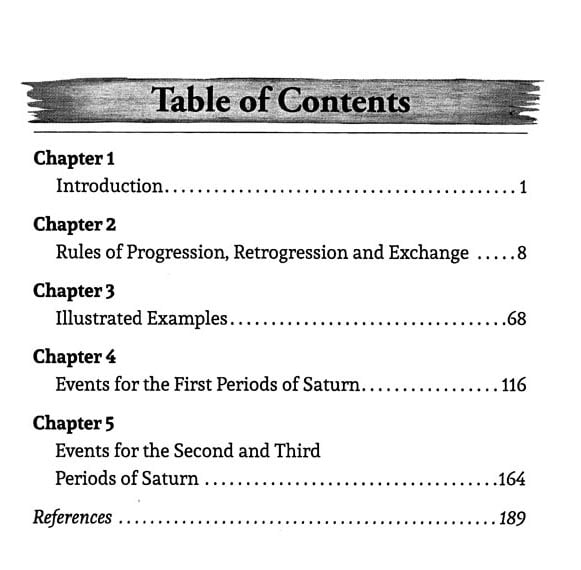
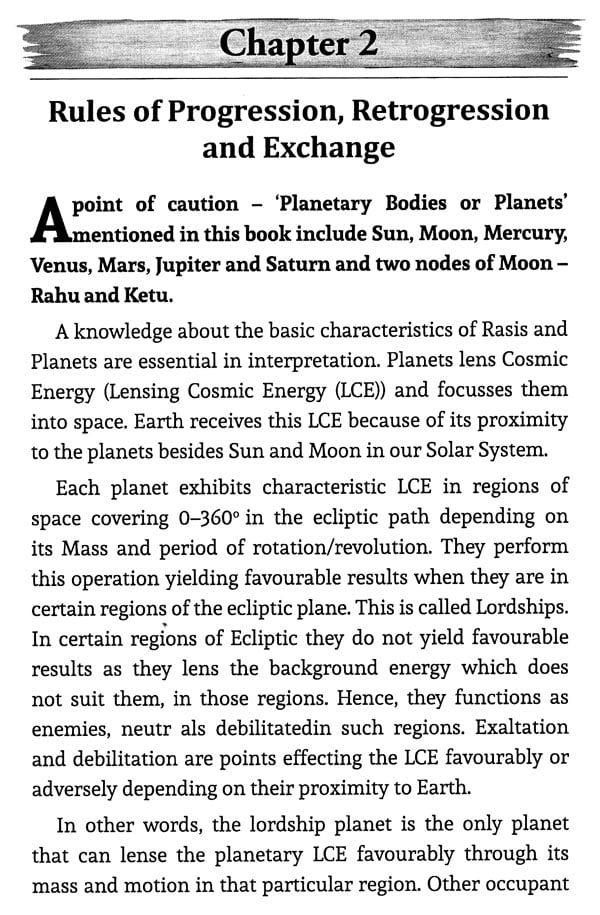
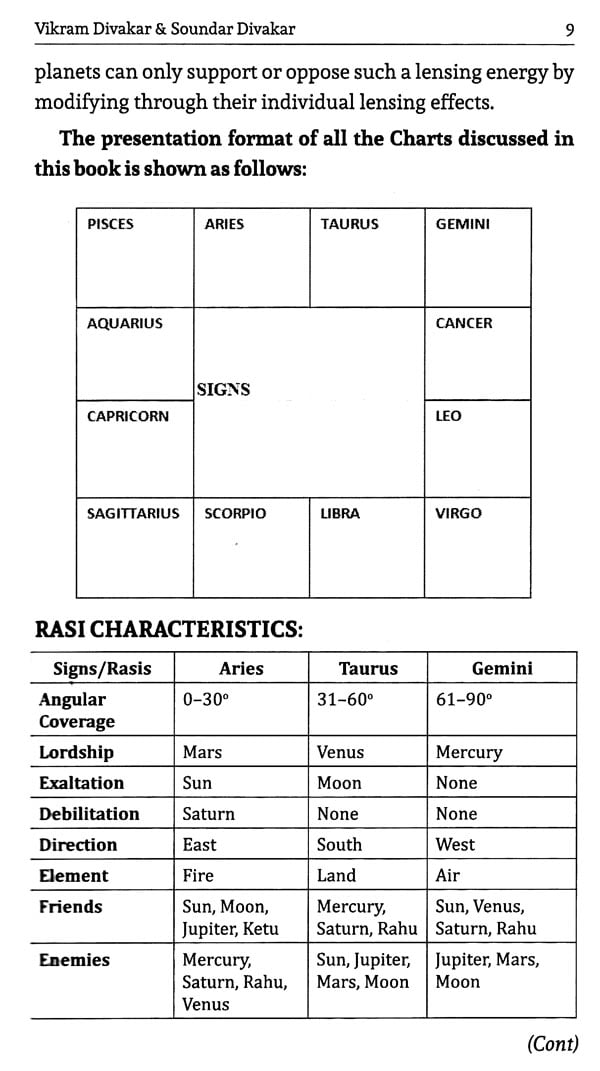


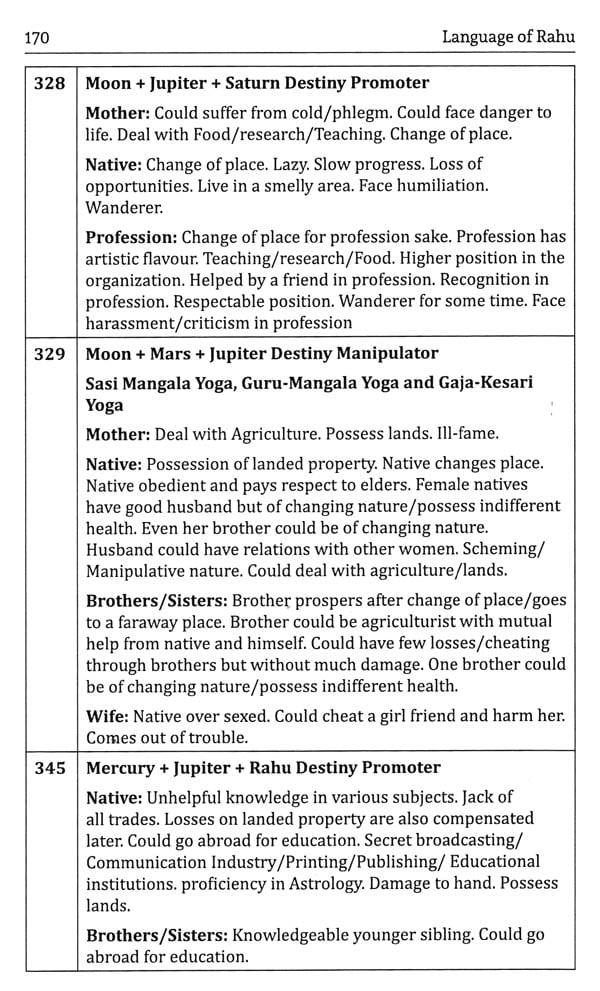
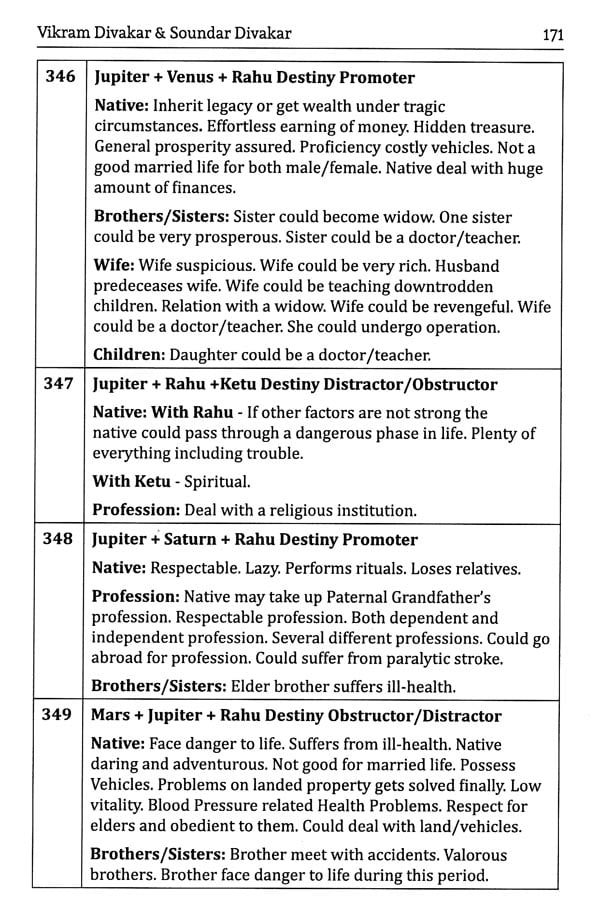
Send as free online greeting card
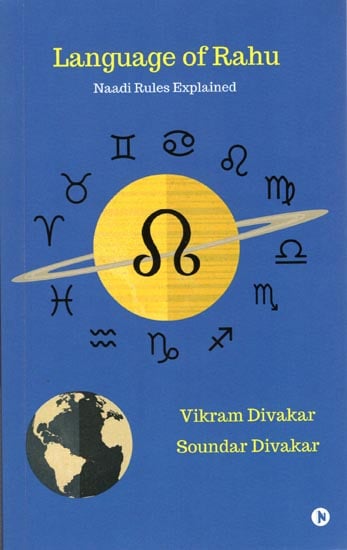
Visual Search